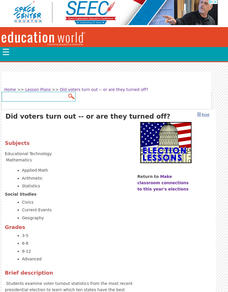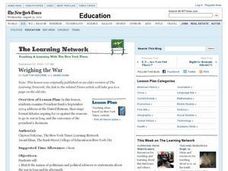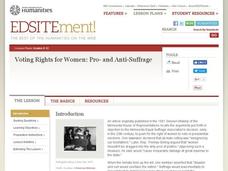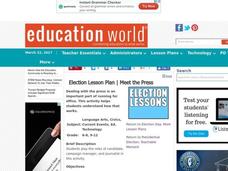Curated OER
Cartoons for the Classroom: Celebrating the 19th Amendment
Eighty-eight years after women earned the right to vote, a women ran for president. Young analysts consider the role women play in politics, how they are portrayed, the standards they are held to, and if they are still treated unfairly...
Curated OER
The Kennedys: An American Camelot?
A life in pictures makes sense for a frontline public family like the Kennedys. Slides depict the parents and each sibling as successful, sad, or tragic. The initial slide provides two web links for information to go along with the images.
John F. Kennedy Presidential Library & Museum
Picture It: JFK in High School
Elementary schoolers learn about young John F. Kennedy. After a teacher-led discussion about his high school years, pupils examine a photograph of Kennedy and four of his friends taken on the grounds of the Choate School in Connecticut....
John F. Kennedy Presidential Library & Museum
Military Advisers in Vietnam: 1963
How did the beginning of the Vietnam War factor into the Cold War with the Soviet Union? As part of a study of American involvement in Vietnam, class members read a letter address to President Kennedy and his response in which he...
John F. Kennedy Presidential Library & Museum
Ask Not What Your Country Can Do for You
Ask not what the lesson here can do for you, but what you can do with the lesson. The answer is quite a lot! Young scholars revisit JFK's famous inaugural address with a focus on his plea for civic engagement. There's a letter to JFK...
Constitutional Rights Foundation
The Election of 1912
The Election of 1912: an election with four competitive opponents. Pupils get to know the candidates with informative reading passages that provide context to the election. Then, the class engages in a debate and answers questions as one...
Curated OER
Presidents Picture Book
Learners create a picture book of the U.S. presidents. They study general information about the U.S. presidents, write a sentence about each president, and create a picture book about the U.S. presidents.
Curated OER
Did Voters Turn Out -- or Are They Turned Off?
What was the voter turnout at your last state election? Examine voter turnout statistics from the most recent election to learn which ten states have the best turnout record. This lesson plan offers election data, handouts, and worksheets.
Curated OER
Validating Votes
Explore the discrepancies in Florida's vote counting process in 2000 and 2002 with this New York Times reading lesson. Middle schoolers study the viewpoints presented in informational text, paying attention to how word choice can...
Curated OER
Create a Public Opinion Survey: The Middle East in the News
Though the discrete content here is a pair of New York Times articles about a 1998 military strike on Iraq and the coincident impeachment by the House of Representatives of then-President Clinton, this detailed plan for creating,...
Curated OER
Speech! Speech!
Critical thinkers consider how word choice in speeches impacts the meaning and effectiveness of the message being presented. They examine and respond to some of the speeches made at the 2004 Republican and Democratic National Conventions.
National Endowment for the Humanities
The Monroe Doctrine: A Close Reading
Students identify specific passages in the Monroe Doctrine to events in early U.S. diplomacy.
National Endowment for the Humanities
The 1828 Campaign of Andrew Jackson: Changes in Voting Participation
Students give examples to indicate how voting participation changed in the first half of the 19th century, and make connections between changes in voting participation and the results of the election of 1828.
National Endowment for the Humanities
The 1828 Campaign of Andrew Jackson: Expansion of the Voting Base
Students give examples to indicate how the franchise was extended and limited in the first half of the 19th century, and cite some differences in the newly enfranchised population that could affect the way they would vote.
Curated OER
Weighing the War
Study opposing viewpoints with this lesson, which examines President Bush's September 2004 address at the United Nations. Middle schoolers study the text of the address, and then stage formal debates arguing for or against the reasons to...
Curated OER
Citizenship and the Constitution
Students identify government officials and resources on a local, state and national level. They determine the structure of local, state, and national governments.
Curated OER
A President's Home and the President's House
Students examine the differences between the White House and Monticello. In small groups, they complete a virtual tour, complete a graphic organizer, take notes during the tour, and identify activities taking place at the White House.
Curated OER
Voting Rights for Women: Pro- and Anti-Suffrage
Students examine the arguments for and against suffrage for women in the 19th and early 20th centuries. They explore various websites, read and discuss primary source documents, develop a document from two points of view, and analyze...
Curated OER
The President's Roles and Responsibilities: Communicating with the President
Students examine the roles and responsibilities of the U.S. president and their own roles as citizens of a democracy. They explore various websites, listen to a State of the Union address, and write a letter to the President of the...
PBS
The History and Use of Sampling Methods
Young mathematicians define population, draw convenience sample from the population, draw quota sample from the population, and draw random probability sample from the population. They explain why a random probability sample usually...
Curated OER
The Role of the Judiciary in a System of Separation of Powers and Checks and Balances
High schoolers determine the role of each branch of government in a system of checks and balances. They demonstrate the role of the judiciary in American government
Curated OER
Meet the Press
Students participate in a role play revolving around political elections. The roles of candidate, campaign manager, and journalist emphasized in this activity. Students listen to candidate interviews that are available online.
Curated OER
Persuasive Practice: A Mt. Rushmore Addition
Budding authors research a US President and persuade the National Park Service to add him to Mt. Rushmore. In addition to the persuasive essay, individuals are required to develop a visual presentation using a web-based software that...
Curated OER
The Last Word: Using Critical Thinking and Analysis to Reach a Decision
Want to explore the process of writing a persuasive essay and tie it in with the upcoming elections? Class members use Venn diagrams and the hamburger model of persuasive writing to write a five-paragraph essay on elections and...
Other popular searches
- Presidential Inauguration
- Presidential Elections
- Presidential Protection
- Presidential Duties
- Presidential Cabinet
- 2000 Presidential Election
- 2008 Presidential Elections
- Presidential Election Voting
- Presidential Biographies
- Presidential Debate
- Presidential Powers
- Presidential Campaigns









